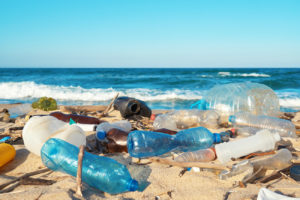A Novel Solution To Plastic Pollution
Researchers have tried several different reuse approaches for addressing the growing global plastic waste stream. Plastics are almost exclusively made from petroleum, and they retain a lot of potential energy after they have been used. So, it may seem to make sense to simply burn them for power.
The main challenge with this approach is that combustion of plastics creates several undesirable pollutants, such as dioxins and furans. Waste plastics may also contain undesirable components. PVC, for example, is polyvinyl chloride, and the chlorine atoms can form corrosive hydrochloric acid when combusted.
Pyrolysis is a different approach that involves the thermal degradation of plastic waste in the absence of oxygen to produce a liquid oil. Although it suffers from similar problems, this decades-old approach seems to be the most common. But it creates many undesirable byproducts, and the resulting oil requires significant additional processing.
But one Canadian company believes they have found a novel solution to the problems that have plagued the pyrolysis approach. This approach opens the door to options never considered possible before.
Aduro Clean Technologies of Sarnia, Ontario, was founded in 2011 with a focus on upgrading bitumen, which is a semi-solid form of petroleum found in abundance in Canada. 70 years after the emergence of the Canadian bitumen industry, this small company identified that trace metals that are native to the bitumen, and are a nuisance in oil refining, play an important catalytic role in breaking down complex bitumen components, thus improving its properties and value.
Furthermore, the company discovered that certain bio-based materials could replace hydrogen gas required in hydrocracking reactions. Next, the company recognized that the same chemistry it applied to upgrade the bitumen and renewable oil could be applied to plastics, for their controlled conversion into liquid hydrocarbons under milder conditions than unselective, decades-old pyrolysis methods.
The sustainable Aduro approach involves addition of water, naturally-occurring metals, and bio-based material such as glycerol or cellulose. This deconstructs the long molecules (polymers) in waste plastics into smaller molecules. The approach is analogous to the hydrocracking process in a refinery but is conducted at much lower temperatures without the requirement to add hydrogen gas or use exotic, expensive catalysts.
Read the full story at Forbes, and find out what else was revealed during further analysis of the waste plastic problem.



